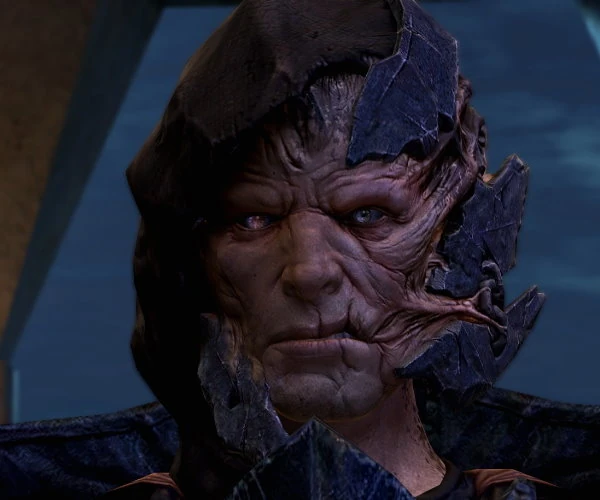We’re back with our “Let’s Talk About…” series! Check out the previous chats here.
Let’s Talk About… our Favorite Villains
Well, it depends what you mean by “villain.” I’m always a fan on the complex villain. You know, the one who has a backstory and good intentions, or the one who really and truly thinks he or she is doing the right thing. Of course, having a villain who elicits anger or frustration can also be strangely satisfying, as well.
I might consider a person like Handsome Jack to be a particularly good villain, since he truly believes he is (and may well possibly be) the hero. I usually find villains like Saren and Loghain to be interesting, and I really, really wanted to punch Ghirahim pretty much any time he appeared in Skyward Sword, even though he might have had more going on beneath the surface than originally surmised.
But let’s talk about another villain, one that I mentioned I was a little disappointed in not too long ago: Corypheus from Dragon Age: Inquisition.

Oh, hello.
See, I wasn’t really fair toward poor old Corypheus last time. Don’t get me wrong, he’s still a bit underwhelming as far as I’m concerned, mostly because he wasn’t given too much of a backstory and yet has so much backstory that could have made him a little more interesting.
But I digress.
When people discuss Corypheus, usually his ineptitude is described as either being underwhelming, or being exactly what Dragon Age: Inquisition needed. He was a guy there to push the plot forward and set in motion events that rocked Thedas and started a bit of a schism in the Chantry and pushed a nobody into the role of Inquisitor. His boss battle wasn’t particularly difficult (insofar as I don’t think my Inquisitor died, which for me is saying something), and he was just… irritating.
And yet…
Drop a mountain on his head? He gets up and comes back. His plan to destroy the world backfires? He comes back and taunts you. Foil his plan at every turn? This guy just keeps coming.
You have to hand it to him, though: the guy’s dedicated and has an unbreakable will.
And he does something that makes him a pretty good villain in regards to “story arc” of Inquisition. His actions cause the creation of, well, The Inquisition. The Inquisition that, in its own DLC, begins to cause problems in its arrogance and power. The Inquisition that, like the Chantry, has the best of intentions, but…
…well. I’m not going to spoil it. And I’ve meandered away from talking about Corypheus, haven’t I?
Love him, hate him, or love to hate him, even though Corypheus isn’t the most powerful villain, he is exactly what the story of Dragon Age: Inquisition needs to propel the story to its satisfying conclusion.
What do you think? Is Corypheus a “good” antagonist? Or is he just sort of annoying? Why not both? Which villain do you think gets less credit than he or she deserves? Let me know in the comments!
Thanks for stopping by, and I’ll see you soon!
~ Athena
What’s next? You can like, subscribe, and support if you like what you’ve seen!
– Support us on Patreon, become a revered Aegis of AmbiGaming, and access extra content!
– Say hello on Facebook, Twitter, and even Google+!
– Check out our Let’s Plays if you’re really adventurous!


Great post! I have an affinity for villains nd I’m not quite sure why. The thing about a great villain is that they bring out a side of our heroes that we wouldn’t see otherwise. Villains keep things balance and without them, we wouldn’t necessarily enjoy or games or movies as much.
-Luna
LikeLiked by 2 people
This is very true. Without villains, there would usually be no plot, and definitely no forward movement for either the story or the protagonist’s character development. Without villains, stories would definitely be very stagnant and boring!
LikeLiked by 2 people
Inquisition needed a villain like Corypheus, so that you don’t pay attention to the magnificent bastard on your side. I always thought it was a neat bit of skilful deception. But I am not entirely sure he IS the main antagonist. At times it seems like Thedas is its own enemy.
Personally, a villain I think gets very little credit is your budget in games like Democracy or SimCity. It sounds like a joke, but I swear it is not. The lack of money is the greatest killer in that type of game.
LikeLiked by 1 person
It did, both to create the Inquisition and distract from certain other characters… But to go by his name, he’s not really “evil” either, is he? And you’re right that Thedas can self-destruct without much outside help haha.
You’re right! Money definitely causes problems, doesn’t it?? And drives the plot, and… I think you’re on to something!
LikeLiked by 1 person
Damn money, if only it weren’t necessary for almost everything. D:
Hmmm, now I am wondering about evil in Dragon Age. Who do you think is the greatest evil in that ‘verse? That’s a tough one, IMO.
LikeLiked by 1 person
Yeah… sigh…
Thinking you/your people are completely right and being unwavering to ideas outside of the scope of your own experiences is the greatest threat that ever faces Thedas, in my opinion.
In DAO, Loghain couldn’t stand the idea of Orlais being an ally or believe that an army outside of his would be needed to defeat the Blight, in DAII there was the tension between Kirkwall and the qunari, two groups that refused to believe the other one capable of redeeming qualities, and the complete lack of communication between Orsino and Meredith that erupted into a war, and in DAI the main problem was that the continent couldn’t deal with the shifting of power away from the status quo, either before or after the Conclave explosion.
LikeLiked by 1 person
Reblogged this on DDOCentral.
LikeLike
I have not met this Corypheus individual yet, but I will before the end of the year, hopefully! I think Caius from FFXIII-2 needs more villain love. His heart is sort of in the right place… kinda. That’s all I can say 🙂
LikeLiked by 3 people
I’m writing an article on that very thing at the moment. I think Caius (and Yeul) definitely deserve more attention!
LikeLiked by 2 people
I’m very pleased to meet someone else who appreciates the FFXIII games. 😀 I loved the whole Caius, Yeul, Noel story arc. Looking forward to reading your article in the big FF Project!
Note to Athena: Bioware teamed up with Square Enix and there were promotional N7 Mass Effect themed outfits available for the protagonists of FFXIII-2… just sayin’.
LikeLiked by 2 people
Yay! Yes, I know the XIII games aren’t perfect, but I really do like them all! Looking forward to reading your article as well 🙂
LikeLiked by 2 people
Hopefully!
And really? Intriguing…
LikeLiked by 1 person
I haven’t played Dragon Age: Inquisition yet, but it sounds like Corypheus’ role in the game is interesting! I always like ‘villains’ who turn out not to be villains, like Beatrix in FFIX. A favourite of these for me is Yashiro from Tokyo Mirage Sessions #FE – I found him genuinely creepy at first, but he ended up as my favourite character.
LikeLike
I’ve been thinking about villains more than usual due to a project I working on. It’s an interesting question of what makes a great villain (and there’s a video I plan to watch on the subject). Is it achieving one’s villain goals? Or is it being someone whose dark motivations are relatable? I lean towards to latter since I find characterization and relatability key, but it’s such a great discussion question. Alas I can’t speak for this one as I haven’t played DAO yet, but I will!
LikeLiked by 2 people
I definitely think being able to relate to the dark motivations/characteristics make for great villains, especially since then we might see ourselves and realize that although we’re the hero in our own story, we’re the villain in someone else’s… hm…
LikeLiked by 1 person
I watched those videos I mentioned. They were brilliant and pretty much used one particular villain as a paragon, and it made a lot of sense. One of the necessities of a good villain is they do have to believe they’re the hero. A villain who knows their a villain works if you’re going for cartoonish, but if you’re trying to make one compelling, they have to *believe* in what they’re doing.
LikeLike
I’m really fond of Dragon Age’s treatment of villains. They’re not the primary adversaries in the plot. They’re there as a plot device, but there’s always something more that’s really driving the plot from the opposite side. In the original, you’re really fighting against Ferelden’s politics more than you are the Archdemon and his hordes. In 2, you’re fighting against the devotion of various factions in the city to see themselves destroyed. In Inquisition, you’re up against a lot of people really resistant to shifts to the balance in power. The main villain is not the primary antagonist of the piece. I think it frees the writers up to do something more creative with their bad guys than you usually see, particularly in the latter two games.
LikeLiked by 2 people
Yup! While my issues with Corypheus were personal because I just wanted his backstory in the game, he was a good villain for Inquisition’s purposes. DA villains are just there to drive the plot, as much as the hero, like you said, and I think that’s what really gives the games depth: the gamer is up against “real world” issues, with this cartoonish “dragon” figure looming in the distance to make dealing with the real problem more immediately important. And you’re right that is has the double bonus of giving writers more creative freedom with their stories, too!
LikeLiked by 1 person